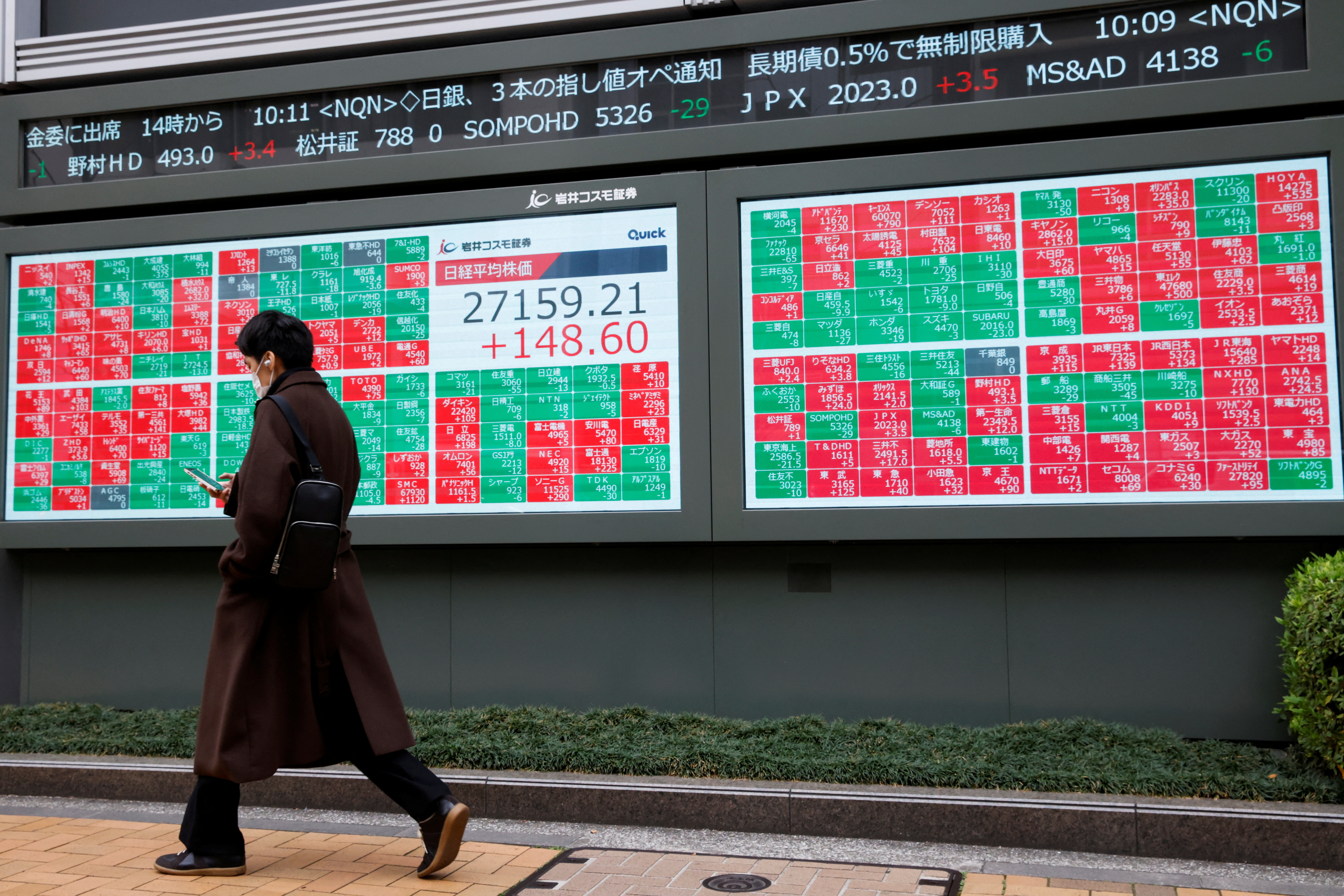
A man walks past an electronic board displaying Japan’s Nikkei average and stock prices outside a brokerage firm, in Tokyo, Japan, March 17, 2023. REUTERS/Androniki Christodoulou/File Photo Obtain licensing rights
SYDNEY (Reuters) – Asian stock markets fell on Monday ahead of U.S. September inflation data this week as investors sought signals on the Federal Reserve’s (US central bank) next possible moves on interest rates.
MSCI’s broadest index of Asia-Pacific shares outside Japan (.MIAPJ0000PUS) fell 0.4%, after US stocks ended the previous session with slight gains.
Australian stocks (.AXJO) and Japan’s Nikkei stock index (.N225) lost 0.25%.
In Hong Kong, the Hang Seng Index (.HSI) fell 1.4% due to declines in real estate stocks and after e-commerce giant Alibaba Group shares fell 3.1% after the sudden departure of outgoing CEO Daniel Chang from its cloud unit. China’s CSI300 Index (.CSI300) rose 0.37%.
The US Consumer Price Index for August is due on Wednesday. Inflation is expected to rise 0.6% month-on-month for August, which would push the annual rate to 3.6%, according to a research note from Wells Fargo.
Investors expect a 93% chance that the Fed will keep interest rates at current levels after its next meeting ends on September 20 but only a 53.5% chance of another stop at the November meeting, according to CME Group’s FedWatch tool.
“Dovish spokespeople at the FOMC have indicated that it may be appropriate to suspend monetary policy in September, and we believe the committee wants time to digest the incoming data,” ANZ economists wrote on Monday.
“The extent of monetary restraint in the economy encourages us to believe that it will slow down, not accelerate again, from now on.”
The yield on the benchmark 10-year Treasury bonds rose to 4.2939%, compared to its close in the United States at 4.256% on Friday. The two-year yield, which rises as traders anticipate higher Fed funds rates, reached 5.0033% compared to the US close of 4.984%.
In China, deflationary pressures eased with the CPI rising 0.1% in August compared to the previous year. That was slower than the average estimate for a 0.2% increase in a Reuters poll but much stronger than the 0.3% decline in July.
China also saw the smallest decline in factory prices in five months. The producer price index fell 3.0% from a year earlier, in line with expectations, after a 4.4% decline in July.
Global energy markets are also closely watching Chevron (CVX.N) negotiations with its workers after strikes began at key liquefied natural gas (LNG) facilities in Australia that provide 5% of the world’s production.
European gas prices have been volatile since August when news of potential labor unrest first emerged.
Gas prices rose as much as 14% following news on Friday that strikes would begin after five days of talks that resulted in no agreement.
On Monday, the dollar fell by 0.41% against the yen to 147.21 yen. It is approaching its highest level this year at 147.87 on September 9.
The single European currency rose 0.1% on the day to $1.0709, after losing 1.22% in a month, while the dollar index, which tracks the US currency against a basket of currencies of other major trading partners, fell 0.057% to 104.79.
US crude fell 0.59 percent to $86.99 a barrel. Brent crude fell by 0.44% to $90.21 per barrel.
Spot gold was trading slightly higher at $1,918.3663 an ounce.
(Reporting by Scott Murdoch in Sydney – Prepared by Mohammed for the Arabic Bulletin) Editing by Edwina Gibbs
Our standards: Thomson Reuters Principles of Trust.

“Beer aficionado. Gamer. Alcohol fanatic. Evil food trailblazer. Avid bacon maven.”
